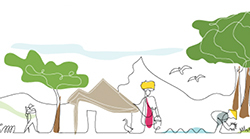Put wood to work for sustainable development, says major conference
2 March 2018

Working across Sectors to Halt Deforestation and Increase Forest Area – from Aspiration to Action, convened on 20–22 February 2018 by the Collaborative Partnership on Forests (CPF) in Rome, Italy, brought together more than 300 participants to explore ways of accelerating progress towards Sustainable Development Goal (SDG) 15.2 on halting deforestation by 2020 and Target 1.1 of the UN Strategic Plan for Forests 2017–2030, which calls for the reversal of forest loss and a 3% increase in forest area worldwide by 2030. ITTO is one of 14 members of the CPF.
Stressing the wide range of benefits of sustainably produced wood, conference participants called for action to change negative public perceptions about the use of sustainable wood compared with other non-renewable materials; provide finance, training and education to sustainably produce wood; create an enabling environment through improved governance and the rule of law; intensively promote sustainable wood products to create demand; and provide incentives for good players in the forest sector.
The conference also addressed the natural capital and ecosystem services of forests and the challenges in valuing these and communicating such value to decision-makers. In remarks to the conference, ITTO Executive Director Dr Gerhard Dieterle noted the importance of creating flexible and simple schemes for payments for ecosystem services (PES) to accommodate both the upfront and the ex-post transfer of benefits to actors involved in forest restoration and protection.
The conference concluded with the following key messages:
- Maintaining sufficient productive, diverse and healthy forests is crucial for achieving the SDGs and climate and biodiversity targets.
- Halting deforestation and achieving SDG 15.2 can only be achieved through political will, individual motivation and concerted collective action, adequate governance frameworks and the involvement of multiple actors across sectors, stakeholders and institutions at all levels.
- Awareness and knowledge of drivers of deforestation and multiple functions of forests need to be enhanced.
- Halting deforestation requires corporate responsibility among agribusinesses, supported by international trade instruments, and consumer education.
- Scaling up finance and investment requires positive incentives, improved legality, private–public partnerships, innovative instruments and de-risking private-sector investment.
- Country experiences and good practices creating win–win situations between forestry and agriculture need urgent upscaling.
- A landscape approach can resolve land-use competition between forests and agriculture.
- There is an urgent need to promote the sustainable use of forest products across the value chain.
- Incomes of small-scale farmers can be increased through diversified agricultural production systems.
- The value of forest ecosystem services should include productivity and environmental values and be captured through simple and direct PES schemes.
- Expanded research is needed to support the development of evidence-based policies.
The conference’s key messages and other outputs will be brought to the attention of the 2018 session of the High-level Political Forum through the 13th session of the United Nations Forum on Forests.
More details on the conference are available here.
Coverage of the conference by the Earth Negotiations Bulletin is available here.